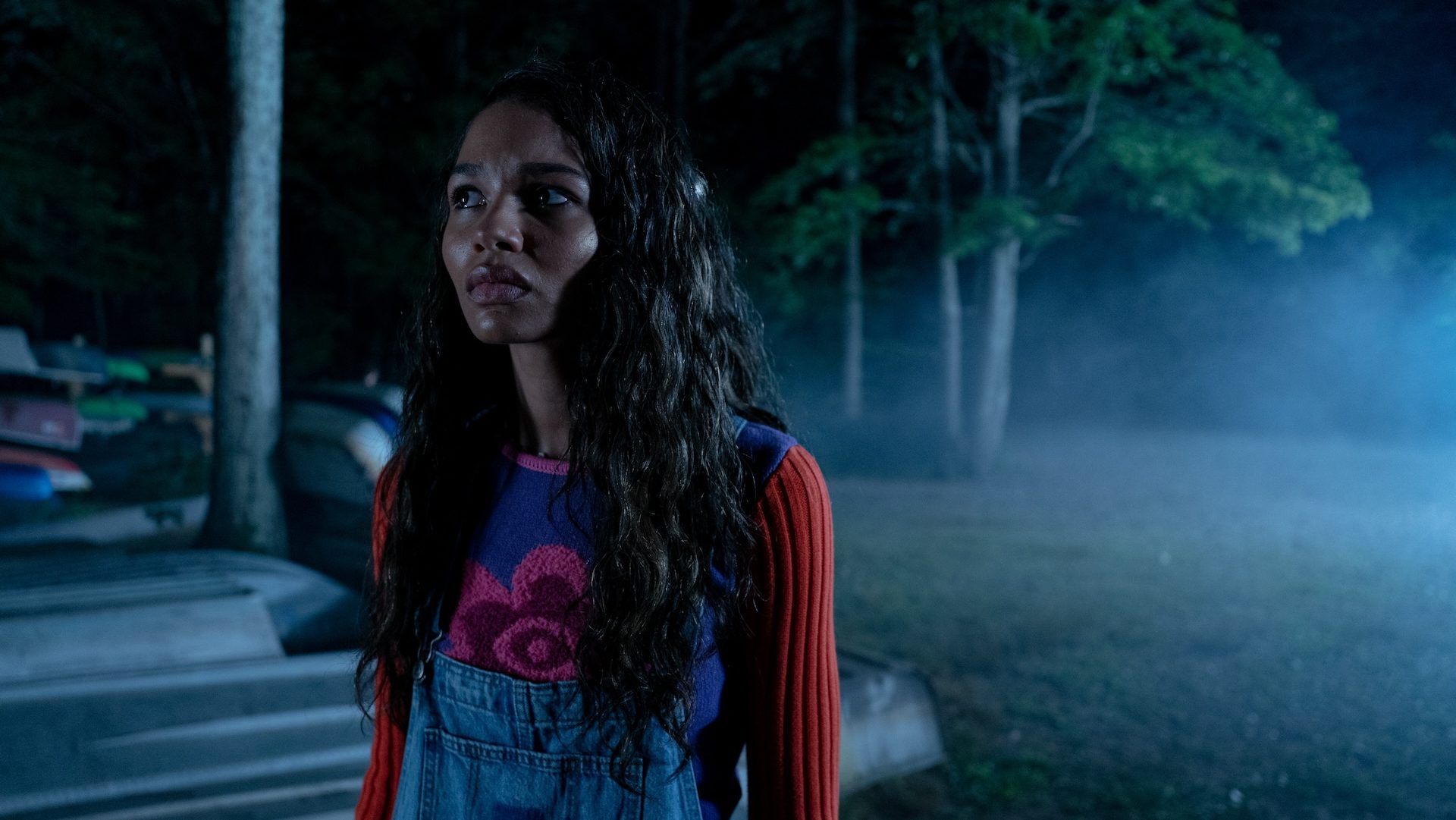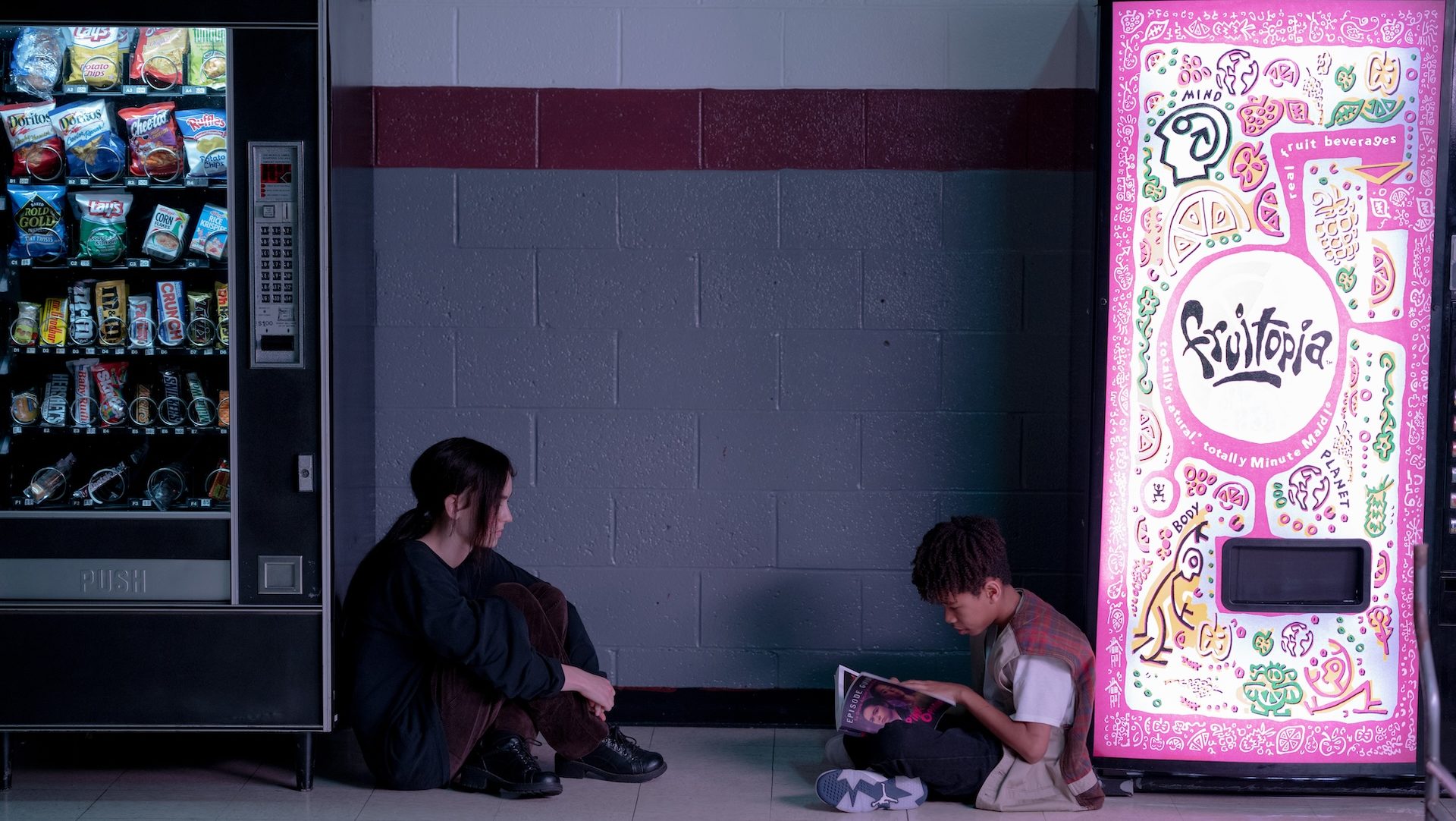“Representation,” for better or worse, tends to be the big talking point when discussing trans media; movies, TV, games, and more are lauded for showing trans people to ourselves. As someone who’s been out as trans for over 20 years, and making trans art for just as long, I tend to roll my eyes at this, lamenting the ways it can limit the stories we tell. The film I Saw The TV Glow takes a moving, fraught approach to this problem, telling a hugely trans story without mentioning trans people at all.
I Saw The TV Glow follows Owen, who begins the movie as a withdrawn 7th grader in 1996, when he meets 9th grade loner Maddy. The two bond over a TV show called The Pink Opaque, a Buffy-esque (down to the credits font) story of two girls who fight a monster of the week through a mystical connection on the astral plane. Owen drifts through childhood until the show is cancelled, when Maddy disappears. Then, Owen drifts through adulthood until Maddy suddenly reappears, with an outlandish story about their connection to The Pink Opaque and a frightening proposition for how they can rekindle it.
(I try to keep things vague from here on out to avoid spoilers, but it’s a bit inevitable in order to dig into I Saw The TV Glow, so let this be your spoiler warning.)
There’s one reading of this movie as a movie about fandoms and young people finding themselves through media. If you grew up in the 90s, you’ll spot appearances from Amber Benson, who played Tara on Buffy, and the stars from The Adventures of Pete & Pete; at the theater I saw the movie in, trailers for these shows played before the lights went down. Director Jane Schoenbrun said, “I think a lot of my own mythology, of my childhood and coming of age, was created by a lot of those shows.” The Pink Opaque brings Maddy and Owen together, and shapes the course of Maddy’s life, at least, in major ways. In adulthood, it remains a place Owen escapes to, though it loses some of its luster over time. I Saw The TV Glow wonderfully uses The Pink Opaque as a focal point without over-explaining the show, giving you enough glimpses to understand it while letting you fill in the gaps with whatever your childhood obsession of choice was.
A movie about realizing things about yourself through childhood nerd culture would be a fine movie, and I think it’s a fine way to read I Saw The TV Glow. But another reading of the movie is that Owen is trans, and also there’s a TV show, and the two don’t have all that much to do with each other. It’s fairly obvious–or maybe obvious if you’re trans–that Owen is not a cis guy, and the entire movie is just about him either not realizing it or not dealing with it. (I tried to write this piece without using pronouns, but it got clunky, and given that Owen never makes overtures toward any other pronouns, it doesn’t feel wrong to use “he,” though it doesn’t feel quite right either.) Whatever gender stuff Owen has going on is shoved so far down that he can only acknowledge it as a howling, empty void inside, and not looking at that void infuses every aspect of his life.
I don’t think he’s entirely ignorant of it; at one point, when he asks his dad if he can stay up late to watch The Pink Opaque, his dad remarks that it’s a show for girls. When Maddy asks him about his sexuality and he says “I think I like TV shows,” I didn’t think he looked confused about himself as much as so intentional about keeping all his desires at bay that he doesn't even know what they are. There’s a scene where he’s wearing a strappy top, possibly a dress, though it wasn’t clear to me if it was a flashback or a fantasy. I read adult Maddy’s offer to reconnect to the show as an invitation to Owen to transition, or at least finally look at the possibility of being trans, or at least stop living the repressed, miserable life he makes no efforts to escape.

As a trans viewer, I Saw The TV Glow feels like a very trans movie, despite the fact that it never once mentions trans people. But it’s not a story about transitioning, the primary story trans people were allowed to tell about ourselves for so long that not telling it shaped my career. Instead, it’s an intensely emotional look at not transitioning; at telling yourself it’s impossible even when you can see that it isn’t, because you think it’s just impossible for you; at what choosing that path feels like and where it leads. Nothing, even Maddy’s reappearance or the TV show that matters so much to them, can really get through the static of the unspoken that overwhelms Owen’s life. Through that lens, The Pink Opaque is almost incidental to the story–it’s worth noting that I didn’t catch anything explicitly queer or trans about the show, or even an in-depth explanation of what Maddy and Owen like about it so much. I think this is a good choice on director Schoenbrun’s part; it keeps the movie from drifting into nerdcore, and it also avoids what I see as a common pitfall of “this piece of media made me realize I’m trans” stories, which can give the media in question (usually made by cis people) too much power over trans people's imaginations. The Pink Opaque doesn’t teach Owen anything about himself or his gender; unlike Maddy, who he watches cry during their viewing nights, it’s just another thing his repression keeps him from touching.
But again, the movie never talks about any of this. I Saw The TV Glow and Schoenbrun’s previous film, We’re All Going To The World’s Fair, received praise for being adjacent-to-the-mainstream films with trans themes by a trans director. I Saw The TV Glow is distributed by A24; at Paste, reviewer Leigh Monson praised the movie for this, writing, “A transgender filmmaker laying bare these specific emotions for a general audience to empathize with is undoubtedly a cause for celebration” and noting that “the relative high profile of I Saw The TV Glow makes it something of a unicorn.”
But because of this profile, I can’t help wondering what it means that we have a mainstream-ish trans film that never actually says the word “trans.” It asks trans viewers to do the work that we did in all that media of our childhoods, reading too much into subtext and giving the film meaning by heaping our own lives on top of it. As a commentary on the necessity of that, especially in the 90s, it’s an artful choice, and to be clear I think the movie would lose all of its power if it made transness explicit. But as someone who sometimes lies awake at night wondering what my career might have looked like if everything I wrote and staged and edited wasn’t so fucking trans, whose undergrad advisor at a prestigious playwriting school told him “No one wants to see that pervert shit” and demanded I write something else when I brought in a thesis play starring trans characters, I can’t help but wonder if the silent presence of transness is part of what makes the movie able to enter the mainstream.

If you’ll let me sound like a cranky old man for a second: everyone’s transition is their own, and there’s no timeline for coming out, and no one way to be trans. But I’ve always looked a little askance–or if I’m being really honest, jealously–at celebrities like Elliot Page or the Wachowskis who came out later in life, who became mouthpieces for the trans community by virtue of already having mouthpieces. The ethics of being out have shifted radically during my lifetime, but I still have a bit of Queer Nation roots to my politics that causes me to read the closet, at least in some instances, as a place of power. And you could argue that we see that in Owen’s life, especially when held up against what Maddy tells him about her own. He isn’t happy–he probably isn’t even in touch enough with his own emotions to be miserable–but his closeted adulthood (if you could call it closeted) has a kind of coherence, and an anemic version of safety, that it seems Maddy’s life lacks. When I let myself read I Saw The TV Glow as a closeted movie about a closeted person, or even as a trans movie that still primarily focuses on the question of transition but just doesn’t call it “transition,” it can feel less like something to celebrate.
But these critiques were just some of the million thoughts that went through my head after seeing the movie, and they're less critiques and more a sign of how many readings the movie supports. If you take cis people’s distribution channels and ticket sales out of it, if you look at it as a story by a trans director that takes trans people as its audience, the movie is a ferocious gut punch, and it would absolutely be lesser if it made its trans content spoken or explicit. Its silence is so loud, Owen’s lack of feeling so emotional, that it couldn’t be the moving, unique story it is any other way.
I Saw The TV Glow is getting a wider release this week; I’m excited for more of my trans friends to see it so we can talk about it, and for more of my cis friends to see it so I can find out how it read to them. (Also, given Schoenbrun’s previous movie: if you, like me, are worried it’s scary, it isn’t.) Maybe it’s a trans movie infiltrating the mainstream in the Trojan horse guise of 90s nostalgia; maybe it’s two movies, one for cis people and one for trans people. Whatever it is, it’s definitely worth seeing.


